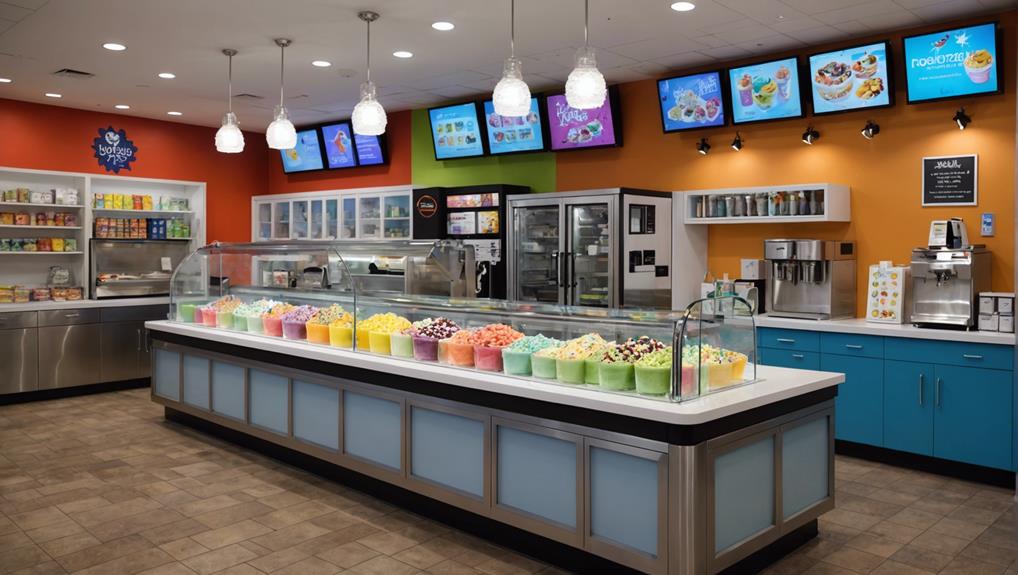Frozen yogurt franchises can enhance sustainability by sourcing ingredients locally and prioritizing organic, fair-trade options. Utilizing biodegradable or compostable packaging reduces plastic waste, aligning with consumer preferences for eco-friendly brands. Energy-efficient lighting like LEDs and renewable energy installations such as solar panels decrease operational costs and carbon footprints. Efficient waste management, including recyclable materials and composting programs, further mitigates environmental impact. Engaging with local communities and maintaining eco-certifications bolster brand loyalty and competitive advantage. Adopting these innovative approaches can result in both significant operational savings and a positive brand image. Interested stakeholders can explore deeper insights and practical implementations.
Key Takeaways
- Prioritize sustainable ingredient sourcing to support local economies and reduce environmental impact.
- Utilize biodegradable and compostable packaging to meet consumer demand for eco-friendly options.
- Implement LED lighting and renewable energy solutions to decrease energy consumption and operating costs.
- Upgrade to energy-efficient equipment and appliances to enhance operational efficiency and minimize environmental impact.
- Engage in recycling and composting initiatives to reduce waste and contribute to sustainability efforts.
Sustainable Ingredient Sourcing
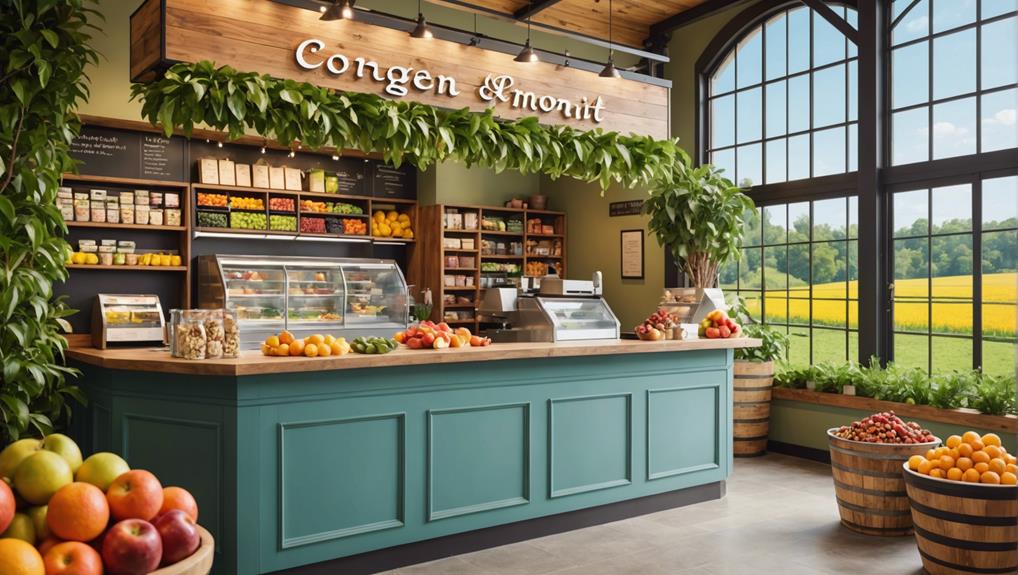
Consistently prioritizing sustainable ingredient sourcing allows frozen yogurt franchises to greatly reduce their environmental impact while simultaneously supporting local economies and organic farming initiatives. By sourcing ingredients from organic farms and local communities, these franchises can implement environmentally-friendly practices that notably lower their carbon footprint. Such practices include reducing transportation emissions and fostering shorter supply chains that emphasize local distribution.
Incorporating fair trade practices and ethical sourcing guarantees that producers are compensated fairly, fostering economic stability within local communities. This approach not only elevates the quality and freshness of the ingredients used but also promotes a more sustainable and resilient supply chain. The commitment to sourcing ingredients sustainably reflects a franchise's dedication to environmental stewardship and social responsibility.
Moreover, transparent communication about these sustainable ingredient sourcing practices can build customer trust and loyalty. Consumers increasingly demand accountability and sustainability from their food sources, and franchises that meet these expectations can differentiate themselves in a crowded market. Ultimately, sustainable ingredient sourcing is not merely a trend but a strategic approach that aligns with both environmental objectives and consumer preferences, positioning frozen yogurt franchises as responsible, innovative leaders in the food industry.
Eco-friendly Packaging
Building on the commitment to sustainable ingredient sourcing, frozen yogurt franchises must also prioritize eco-friendly packaging solutions to further enhance their environmental stewardship. Utilizing biodegradable packaging and compostable cups, made from renewable resources, is a critical step in reducing waste and addressing the global plastic pollution crisis. The traditional packaging methods play a substantial role in landfill overflow, with a mere 14% of plastic packaging being recycled globally.
Adopting sustainable packaging solutions is not only an environmentally friendly practice but also aligns with increasing consumer demand for brands that demonstrate eco-consciousness. This positive consumer response can strengthen brand loyalty and attract a growing demographic of eco-aware customers. Additionally, adhering to sustainability certifications and standards can provide a competitive edge in the market.
Key eco-friendly practices for frozen yogurt franchises include:
- Biodegradable cups and spoons: Made from materials such as cornstarch or sugarcane.
- Compostable packaging: Ensures that packaging materials break down naturally without harming the environment.
- Sustainable sourcing: Using packaging materials derived from renewable resources.
- Consumer education: Informing customers about the benefits and proper disposal of eco-friendly packaging.
- Partnerships with green suppliers: Collaborating with companies that prioritize environmental sustainability.
Energy-saving Practices
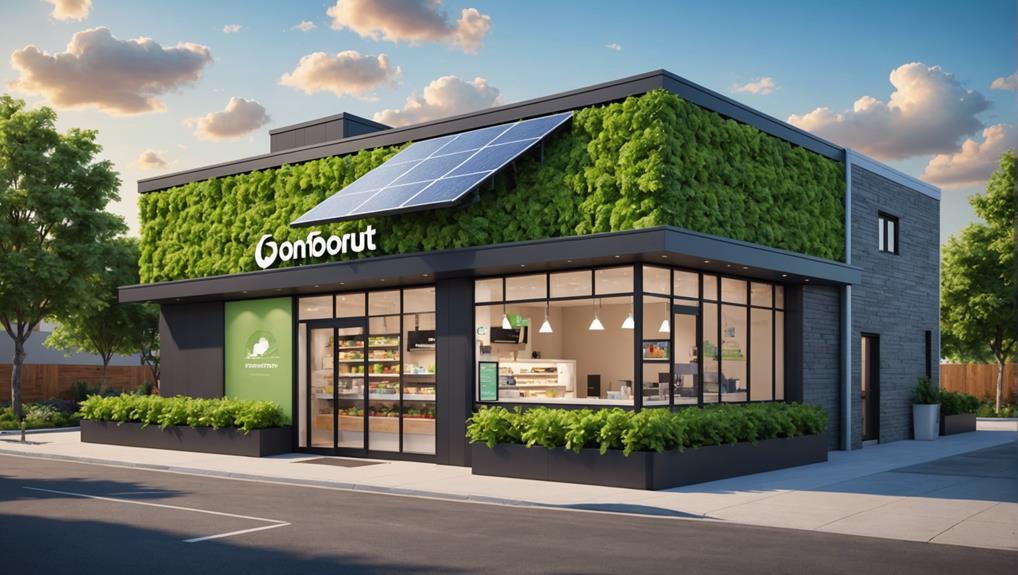
Energy-saving practices in frozen yogurt franchises encompass the adoption of efficient lighting solutions, the integration of renewable energy sources, and the optimization of equipment energy use. By employing energy-efficient light bulbs and state-of-the-art frozen yogurt machines, franchises can greatly lower their energy consumption. Additionally, incorporating renewable energy systems not only reduces operational costs but also enhances the sustainability of the business.
Efficient Lighting Solutions
Implementing efficient lighting solutions, such as LED light bulbs, is an essential step for frozen yogurt franchises aiming to greatly reduce energy consumption and operational costs. Leveraging energy-efficient lighting not only provides immediate cost savings on electricity bills but also contributes to a more sustainable operation. LED light bulbs are particularly advantageous due to their extended lifespan of up to 50,000 hours, far outlasting traditional incandescent bulbs. This longevity reduces the frequency of replacements, further enhancing cost efficiency.
The adoption of LED lighting solutions in frozen yogurt franchises offers several practical benefits:
- Energy Efficiency: LED bulbs can decrease energy consumption by up to 80% compared to conventional lighting, leading to substantial cost savings.
- Heat Reduction: LEDs produce less heat, minimizing the need for additional cooling and thereby lowering overall energy use.
- Durability: With a longer lifespan, LED bulbs reduce maintenance costs and the environmental impact of frequent replacements.
- Enhanced Lighting Quality: LEDs provide superior lighting quality, improving the customer experience and product presentation.
- Sustainable Practices: Implementing LED lighting aligns with broader sustainability goals, reinforcing a franchise's commitment to eco-friendly operations.
Incorporating these innovative lighting solutions ensures that frozen yogurt franchises not only remain competitive but also champion sustainable practices.
Renewable Energy Integration
Embracing renewable energy sources such as solar panels allows frozen yogurt franchises to greatly reduce their reliance on non-renewable resources while promoting a sustainable business model. Integrating renewable energy solutions not only mitigates greenhouse gas emissions but also diminishes the overall environmental impact. By adopting energy-saving practices, franchises can achieve significant reductions in operating costs, enhancing financial viability alongside ecological responsibility.
Renewable energy integration involves more than just installing solar panels. It requires a thorough strategy that aligns with the franchise's long-term sustainable practices. For instance, combining renewable energy sources with energy-efficient lighting and HVAC systems can create a synergistic effect, further lowering energy consumption. This holistic approach underscores the franchise's commitment to sustainability, appealing to a growing demographic of eco-conscious consumers.
Moreover, the initial investment in renewable energy systems can be offset by incentives, tax credits, and reduced utility bills, creating a compelling case for their adoption. Energy-saving practices not only contribute to a cleaner environment but also build brand loyalty among consumers who prioritize green initiatives. Consequently, these sustainable practices position frozen yogurt franchises as leaders in environmental stewardship while maintaining competitive operational efficiency.
Equipment Energy Optimization
Leveraging renewable energy sources like solar panels is just the beginning; optimizing equipment energy efficiency is equally crucial for frozen yogurt franchises committed to sustainability. Modern energy-efficient machines and appliances play a pivotal role in reducing energy consumption. By adopting these advanced technologies, franchises can greatly enhance operational efficiency and minimize their environmental impact.
Energy-saving practices should encompass a broad range of strategies, including the use of non-toxic cleaning supplies and biodegradable materials. These not only align with environmental goals but also enhance the overall health and safety of the operational environment. Moreover, cost-effective practices such as utilizing energy-efficient light bulbs can yield substantial savings, contributing to both immediate and long-term profitability.
Here are some practical measures to optimize equipment energy:
- Upgrade to energy-efficient frozen yogurt machines and appliances that are non-ozone depleting.
- Implement the use of non-toxic, biodegradable cleaning supplies for a safer and greener workspace.
- Install energy-efficient light bulbs to reduce electricity usage.
- Regularly maintain equipment to guarantee peak operational efficiency and longevity.
- Utilize programmable thermostats and smart energy management systems to monitor and control energy use.
Waste Management
Effective waste management in frozen yogurt franchises necessitates the implementation of efficient packaging solutions alongside robust recycling and composting initiatives. By adopting recyclable or biodegradable materials for cups, spoons, and napkins, franchises can greatly reduce landfill contributions. Additionally, partnering with local recycling facilities and composting programs guarantees that organic waste, such as fruit peels and yogurt remnants, is managed responsibly, thereby enhancing sustainability efforts.
Efficient Packaging Solutions
Frequently, adopting efficient packaging solutions in frozen yogurt franchises is imperative to mitigate environmental impact and align with evolving consumer expectations for sustainability. Embracing sustainable practices through environmentally friendly methods, such as focusing on recyclability and reduced plastic usage, is no longer optional but essential for business success. With only 14% of plastic packaging recycled globally, and significant portions ending up in landfills or delicate ecosystems, shifting away from the conventional take, make, dispose model is critical.
Frozen yogurt franchises must prioritize compliance with regulatory changes that demand more sustainable packaging alternatives. This shift not only helps in reducing environmental impact but also caters to the growing demographic of eco-conscious consumers. Innovative solutions in the packaging sector, which commands $1 trillion in global annual spending, are increasingly focusing on materials that offer recyclability and a reduction in plastic usage.
To successfully implement efficient packaging solutions, consider the following:
- Adopt biodegradable materials: Use plant-based plastics or paper that decomposes naturally.
- Implement reusable containers: Encourage customers to bring their own containers.
- Use minimalistic packaging: Reduce excess packaging to minimize waste.
- Opt for compostable options: Select packaging materials that can be composted post-use.
- Engage in consumer education: Inform customers about proper disposal and recycling practices.
These strategies can greatly advance frozen yogurt franchises towards sustainable operations and compliance with evolving environmental standards.
Recycling and Composting Initiatives
Implementing robust recycling and composting initiatives is essential for frozen yogurt franchises aiming to minimize environmental impact and enhance sustainable waste management practices. NuYo Frozen Yogurt exemplifies this commitment by actively seeking local composting programs to reduce waste and promote sustainability. The collaboration with cities developing composting solutions allows NuYo to be environmentally responsible in its operations.
A critical component of NuYo's waste reduction strategy is the use of compostable cups and spoons. Although currently unable to compost spoons, NuYo is diligently exploring ways to enhance its composting practices.
| Initiative | Impact |
|---|---|
| Local Composting Programs | Reduces environmental footprint |
| Compostable Cups and Spoons | Contributes to waste reduction |
| Exploring Enhanced Composting | Aims to improve sustainability practices |
NuYo's focus on integrating recycling and composting initiatives underscores its dedication to environmental stewardship. By implementing these practices, NuYo Frozen Yogurt not only minimizes waste but also sets a benchmark for sustainability in the frozen yogurt industry. This proactive approach not only aligns with broader environmental goals but also resonates with environmentally conscious consumers, thereby fostering a culture of sustainability.
Supporting Local Economies
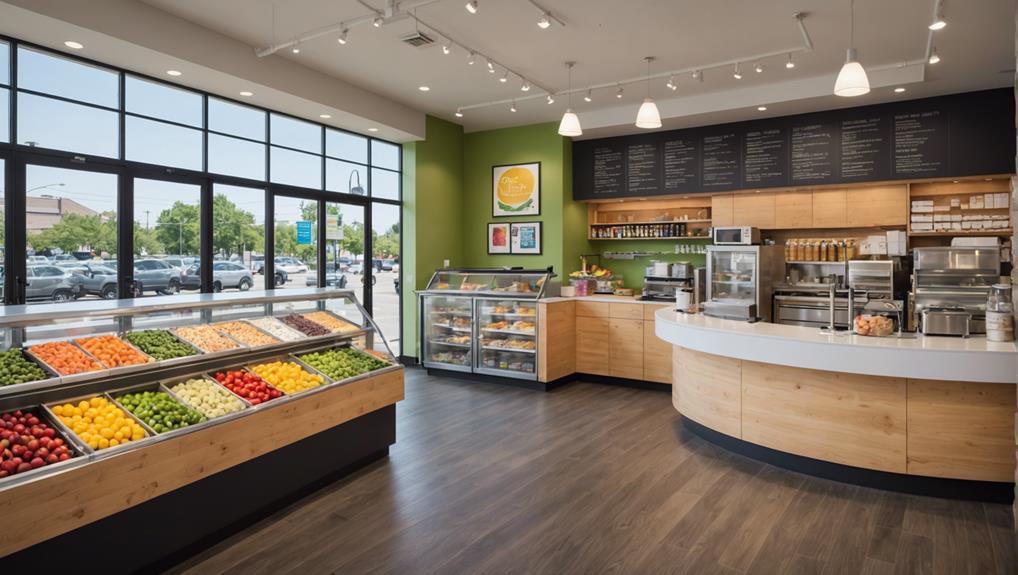
By utilizing locally sourced ingredients, frozen yogurt franchises not only decrease transportation emissions but also strengthen regional economic growth. Engaging with local suppliers guarantees that franchises contribute directly to the prosperity of their immediate surroundings. This strategy creates a ripple effect, fostering a community impact that extends beyond the walls of the franchise and into the local economies.
Partnering with neighboring businesses and local suppliers provides numerous advantages:
- Economic Growth: Investing in local suppliers helps keep money within the community, driving regional economic development.
- Community Impact: Strong ties with nearby farms and businesses can lead to collaborative community projects and events.
- Reduced Carbon Footprint: Sourcing ingredients locally minimizes the environmental impact associated with long-distance transportation.
- Enhanced Quality and Freshness: Locally sourced ingredients often mean fresher and higher-quality products, enhancing customer satisfaction.
- Increased Brand Loyalty: Customers are more likely to support businesses that demonstrate a commitment to local communities and sustainability.
Reducing Transportation Emissions
Reducing transportation emissions in frozen yogurt franchises necessitates innovative strategies that encompass local sourcing, energy-efficient practices, and streamlined logistics. By prioritizing local sourcing, franchises can greatly reduce the emissions associated with long-distance shipments. Procuring ingredients from nearby farms and suppliers not only supports local economies but also decreases transportation emissions, aligning with broader sustainability goals.
Energy-saving practices within store operations further contribute to lowering the carbon footprint. Efficient refrigeration systems, optimized delivery schedules, and meticulous route planning are crucial components of this strategy. Eco-friendly packaging also plays an important role; lighter packaging materials reduce the overall weight of shipments, thereby decreasing fuel consumption and transportation emissions.
Efficient logistics are crucial to minimizing emissions. Utilizing advanced distribution systems and route optimization software can streamline transportation, ensuring that shipments are delivered using the shortest and most fuel-efficient paths. Additionally, offering online ordering and delivery services allows for the consolidation of customer orders, reducing the frequency and number of individual trips required for delivery. This not only enhances customer convenience but also significantly lowers transportation emissions.
Employee Welfare
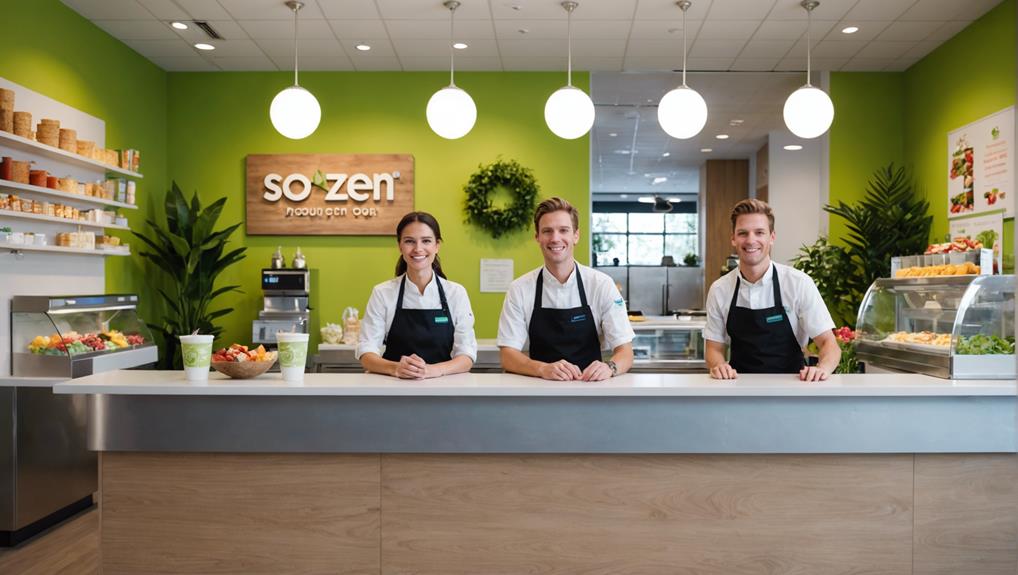
Guaranteeing employee welfare in frozen yogurt franchises requires a multifaceted approach that includes fair compensation, safe working conditions, and continuous opportunities for professional growth. Providing living wages and adhering to labor laws form the baseline of a robust employee welfare strategy. However, progressive franchises go beyond compliance to foster an environment where workers can thrive.
By implementing fair wages, these businesses guarantee that their employees are not only motivated but also able to meet their basic needs. Safe working conditions further reinforce a commitment to employee welfare, minimizing risks and promoting health. Career advancement opportunities and skill development initiatives are essential for maintaining a motivated workforce and contributing to long-term employee satisfaction.
Innovative solutions include:
- Fair wages and living wages: Guaranteeing employees receive compensation that meets daily living costs.
- Safe working conditions: Regular safety audits and training programs to promote a secure workplace.
- Career advancement: Clear pathways for promotion and personal growth within the franchise.
- Skill development: Workshops, training sessions, and educational assistance to enhance employee capabilities.
- Compliance with labor laws: Strict adherence to local and federal regulations to protect employee rights.
Community Engagement
Effective community engagement for frozen yogurt franchises involves strategically fostering relationships with local organizations and participating in initiatives that demonstrate a commitment to social responsibility. Franchises can achieve this by forming partnerships with local charities and schools, which can amplify their social impact. Hosting fundraising events and sponsorships not only enhance community involvement but also position the franchise as a responsible and caring local entity.
Collaborating with community events and local farmers markets can further boost brand visibility while supporting regional economies. Such partnerships enable franchises to embed themselves within the community fabric, fostering loyalty and trust. Additionally, engaging in volunteer programs and environmental clean-up efforts underscores a franchise's dedication to sustainability and public welfare. These activities not only benefit the community but also enhance employee morale and attract socially conscious consumers.
Building robust relationships with neighboring businesses and residents is equally essential. This can be achieved through joint promotions or local business alliances, creating a symbiotic environment where all parties thrive. By actively participating in these community engagement initiatives, frozen yogurt franchises can solidify their reputation as pillars of social responsibility, thereby sustaining long-term success and community support.
Certifications and Standards
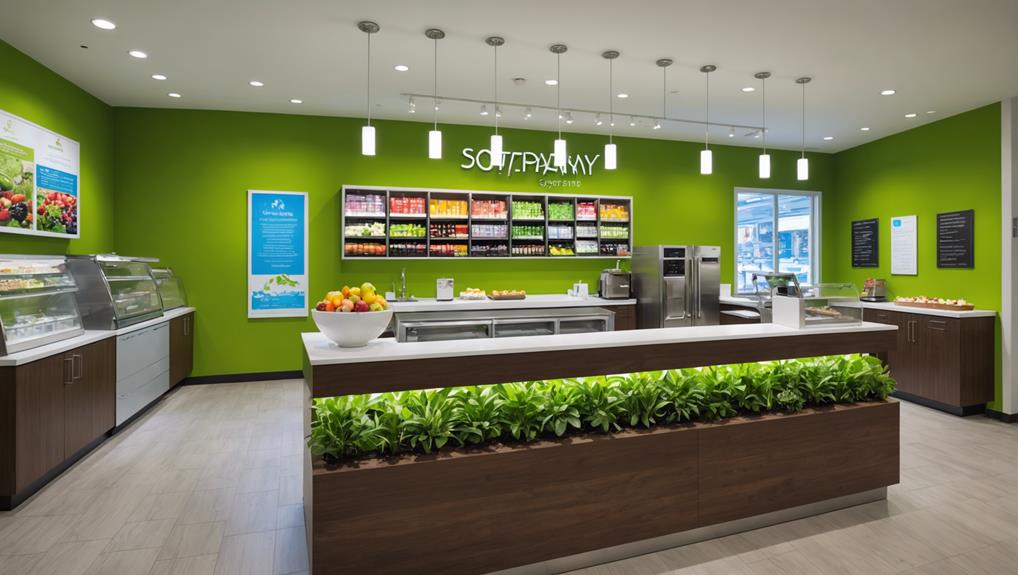
Certifications and standards such as B Corporation, USDA Organic, and Fair Trade Certification serve as benchmarks for validating the sustainability practices of frozen yogurt franchises. These certifications not only guarantee consumers of a franchise's commitment to sustainability but also position the business as a leader in environmental stewardship and ethical sourcing practices.
LEED (Leadership in Energy and Environmental Design) certification, for instance, ensures that the franchise's physical buildings are constructed and maintained using environmentally responsible and resource-efficient methods. This reduces overall environmental impact and enhances energy efficiency.
To further support sustainable practices, the Sustainable Forestry Initiative (SFI) certification promotes responsible forestry and the ethical sourcing of paper and packaging materials. This ensures that any wood-based products used by the franchise come from responsibly managed forests.
Moreover, ISO 14001 certification demonstrates a franchise's commitment to continuous improvement in its environmental management systems, ensuring that sustainability is an ongoing priority.
Here are five key certifications and standards that a frozen yogurt franchise should consider:
- B Corporation
- USDA Organic
- Fair Trade Certification
- LEED Certification
- ISO 14001 Certification
Frequently Asked Questions
How Can Franchises Balance Cost With Sustainable Practices?
Franchises can balance cost with sustainable practices by integrating energy efficiency, waste management, packaging alternatives, and water conservation. Leveraging renewable energy, local sourcing, and green certifications can further reduce the carbon footprint, ensuring long-term economic viability.
What Incentives Are Available for Adopting Green Technologies?
What incentives are available for adopting green technologies? Government grants, tax incentives, energy credits, green certifications, rebate programs, funding opportunities, eco-friendly loans, and sustainability awards collectively serve as a treasure trove of benefits, encouraging sustainable innovation and environmental responsibility.
Are There Customer Loyalty Programs Promoting Eco-Conscious Behavior?
Yes, customer loyalty programs can promote eco-conscious behavior through eco-friendly rewards, such as loyalty discounts for using reusable containers, green promotions, incentives for recycling, sustainable packaging, digital receipts, and carbon offsets.
How Do Sustainable Practices Impact Product Shelf Life?
Implementing sustainable practices such as energy-efficient storage and biodegradable packaging can extend product shelf life by up to 15%. Utilizing organic ingredients, local sourcing, and eco-friendly cleaning methods further enhances quality while reducing waste and promoting green energy.
What Are the Long-Term Financial Benefits of Going Green?
Adopting energy efficiency, waste reduction, and green packaging leads to significant cost savings. Utilizing renewable energy, eco-friendly materials, and sustainable sourcing reduces the carbon footprint, while water conservation enhances operational efficiency, ensuring long-term financial benefits.
Conclusion
Implementing sustainable practices in frozen yogurt franchises is essential for environmental stewardship and long-term business viability. Franchises that adopt eco-friendly packaging can reduce plastic waste by up to 80%, demonstrating a significant environmental impact. Emphasizing sustainable ingredient sourcing, energy efficiency, and local economic support further enhances credibility and community relations. Through rigorous adherence to certifications and standards, these initiatives collectively foster a sustainable and ethical business model, aligning economic success with ecological responsibility.


